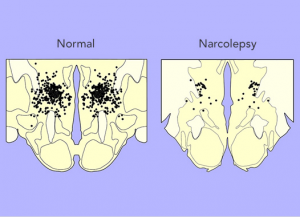What Is Narcolepsy?
You’re just about to start studying for final exams, and you know you’re going to need something to keep yourself awake all night. So you’re waiting in line at the grocery store, prepared to stock up on energy drinks. The person behind the counter turns to you, smiles, and asks how you’re doing. Promptly, you collapse and fall asleep on the floor.
Okay, so maybe that doesn’t happen to most people. But if you have narcolepsy, spontaneously falling asleep is something that you may routinely experience.
Narcolepsy is a chronic brain disorder characterized by the inability of the brain to properly regulate sleep-wake cycles. With narcolepsy, a person might feel constant overwhelming daytime sleepiness, and experience sudden, irresistible bouts of sleeping. For reference – the exhaustion you feel after pulling a study-motivated all-nighter or two is probably comparable to the level of exhaustion a person with narcolepsy might feel during any given day, even after a full night’s rest. In addition to a difficulty staying awake, people with narcolepsy may also have difficulty staying asleep, and may suffer from a variety of sleep disorders.
Roughly 70% of people who suffer from narcolepsy also experience cataplexy. Cataplexy is a sudden muscle weakness triggered by strong emotions – essentially, it’s an abrupt loss of a person’s ability to control or move their own muscles. This typically causes the person to collapse and be immobile, unable to move despite the fact they are fully conscious.
Hypocretins
Recent studies have revealed the mechanisms in the brain behind narcolepsy with cataplexy, and it has to do with special neurotransmitters called hypocretins. During waking hours, hypocretins are released from neurons in the hypothalamus and bind to hypocretin receptors on target neurons, promoting wakefulness and suppressing rapid-eye-movement (REM) sleep. Essentially, if you’re awake, hypocretins are partly responsible for keeping you that way.
People with narcolepsy, however, have drastically fewer neurons that produce hypocretins, meaning that their brains aren’t getting those signals to stay awake and to stay out of REM sleep. Many researchers suspect that these reduced neuron numbers make it exceptionally easy for a narcoleptic individual to cross the barrier between wakefulness and sleep randomly and frequently. It may also cause a blurry line between sleeping and wakefulness, resulting in some of the other symptoms of narcolepsy, such as dreamlike hallucinations while awake.
The graphic below depicts the reduced number of hypocretin-producing neurons in the hypothalamus between those with narcolepsy and those without narcolepsy
.
http://healthysleep.med.harvard.edu/narcolepsy/what-is-narcolepsy/science-of-narcolepsy
Genetics
Researchers have also found that genetics has some role to play in narcolepsy. Many people with narcolepsy carry a certain gene that codes for the human leukocyte antigen, which plays a role in immune function. Other genetic factors shown to influence development of narcolepsy also seem to have immune-related functions, suggesting that the immune system may be killing off the neurons that generate hypocretin.
Conclusion
Narcolepsy is a complex sleep disorder influenced by a variety of factors, not all of which we know. But gaining a deeper understanding of the underlying mechanisms of narcolepsy can help scientists focus on treatments and cures for this disorder (currently, there is no cure for narcolepsy). Ultimately, we can create a better quality of life for people with narcolepsy.
References
“Understanding Narcolepsy.” Healthy Sleep. N.p., n.d. Web. 06 Nov. 2016.
“Narcolepsy Fact Sheet.” National Institute of Neurological Disorders and Stroke, 6 Apr. 2016. Web. 05 Nov. 2016.
I find this to be a really cool topic that you covered in this blog. I have known about narcolepsy for awhile now, but never really understood what the causes were behind it or whether it was a genetic disorder or something that was maybe just random. The image you provided is a great graphic that really expresses the difference in hypocretins. Do you know if sleeping pills like Restoril, would help to treat narcolepsy? My thinking is that it might help them to maintain a regular sleep schedule. But, maybe as you were saying, people with narcolepsy could still fall asleep in the middle of the disturbing that attempt at regulation.
Good question! I had the same thought. When I researched treatments, sleeping pills never cropped up, and I wasn’t able to find much about their effect for someone with narcolepsy. So.. I’m not actually sure how well they would work! It seems like most treatment options are geared toward relieving daytime sleepiness and cataplexy rather than providing sound sleep at night.
This is a truly fascinating topic.
What sorts of treatments are there for people with narcolepsy? Is there potential for gene therapy to help those with narcolepsy?
So far there are no safe approved medications for hypocretin production, but gene therapy research is underway for just that. At the moment, treatment options are geared just to relieving symptoms, rather than the cause. For example, stimulants to help keep people with narcolepsy awake.
Interesting! Where did you get your graphic? I’d love to see you add some links to further information.
Thank you! the graphic came from one of the references listed at the bottom, but I definitely should have indicated that or put a link beneath the picture. Oops! I’ll fix that now.
I found this to be really interesting! You say there is no cure as of yet, but have you found any information on studies being done to improve treatment? I’m wondering if genetic modification is something worth looking into as a method of treatment and if there is a way to stimulate the production of hypocretins in patients with narcolepsy.
So far, it doesn’t seem like scientists have reliably been able to stimulate production of hypocretins in humans, although research on that is underway: studies have shown promising gene therapy results in narcoleptic mice. Most narcolepsy medications stimulate production of dopamine to increase alertness, but many studies are being done about gene therapy and histamine production.
This article is helpful for more information. http://healthysleep.med.harvard.edu/narcolepsy/treating-narcolepsy/developing-new-treatments